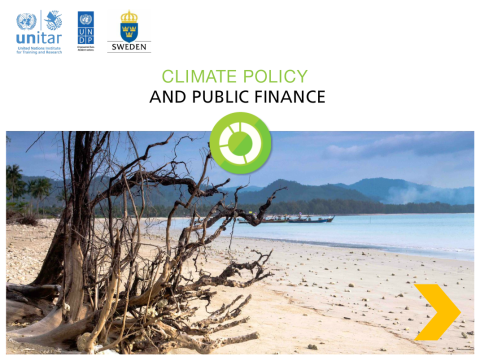
Climate Policy and Public Finance
IMPORTANT: Please register directly on the course website: http://unccelearn.org/
This tutorial aims to build an understanding of the links between climate policy and public finance, as the national budget plays a critical role in a country’s climate change response.The tutorial is divided into five sections, and it takes around 30 minutes to complete all sections.
The tutorial has been developed by UNITAR as part of the regional project “Strengthening the Governance of Climate Change Finance to Benefit the Poor and Vulnerable in Asia and the Pacific,” implemented by UNDP with financial support from the Swedish Development Cooperation (SIDA).
After completing this e-tutorial, participants will be able to:
- Define climate information and services.
- Identify the uses of climate information and services in development planning and policy.
- Discuss the role of legislation in strengthening climate information and services.
- Provide examples of instruments available to governments for mainstreaming climate information and services.
The tutorial has five sections:
- What is climate change?
- What is happening in Asia and Pacific?
- How does climate change affect your job as a government official?
- National and international finance for climate change.
- A strategic framework for managing climate finance.
Section 1 introduces the climate system changes observed since the end of the 19th century and predicted in the future, including topics such as temperature rise, changing rainfall patterns, ocean acidification.
Section 2 presents the specific conditions and climate change impacts on Asia-Pacific region. The section also introduces the concepts of climate mitigation and adaptation and gives examples from the Asia-Pacific.
Section 3 illustrates how climate change mitigation and adaptation relate to public officials’ work, including sectors such as transport, energy, planning and finance.
Section 4 presents the size, sources and complexity of climate finance flows and discusses the roles of international, national, public and private actors.
Section 5 provides an overview of the public financial management system of a country, with a focus on the national budget process. This section also illustrates how national planning and budget systems can provide a basis for better management of climate finance.
UN CC:Learn is a partnership of more than 30 multilateral organizations supporting countries to design and implement systematic, recurrent and results-oriented climate change learning. At the global level, the partnership supports knowledge-sharing, promotes the development of common climate change learning materials, and coordinates learning interventions through a collaboration of UN agencies and other partners. At the national level, UN CC:Learn supports countries in developing and implementing national climate change learning strategies. Through its engagement at the national and global levels, UN CC:Learn contributes to the implementation of Article 6 of the UNFCCC on training, education and public awareness-raising, and the 2012-2020 Doha Work Programme. Funding for UN CC:Learn is provided by the Swiss Government and UN partners. The Secretariat for UN CC:Learn is hosted by the UN Institute for Training and Research (UNITAR).

